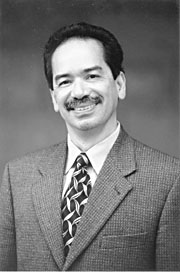|
BY JOHN SANFORD As a young boy, Ramón Saldívar, the Hoagland Family Professor in Humanities and Sciences, was a big fan of Davy Crockett, the frontiersman and congressman mythologized for fighting to the death at the Alamo in 1836. "I loved the name and the idea of Davy Crockett, especially since he had a Texas connection," said Saldívar, who grew up in a city on the gulf coast of the Lone Star State, next to the Mexican border. "He died fighting for independence, liberty and justice, truth for all, etc." Later, of course, Saldívar's admiration for the backwoods hero became more complex. "All of a sudden I realized, wait a minute: Davy's enemies were me and my family! We're the Mexicans that he regarded as evil and cowardly. So what did that make me -- that I was both Davy and Mexican?" Saldívar said that perhaps it's a measure of his reconciliation with this duality that he named his son David, and calls him Davy. (David recently graduated from Stanford Law School and now works for the Texas Attorney General's Office in Austin.) "What I grew up wondering was whether it was possible to be different from and yet part of this culture," Saldívar told the several dozen people who gathered last week in the west transept of Memorial Church for "What Matters to Me and Why," a biweekly lecture and discussion series. Saldívar explained that he looks to the history and stories of his family as a way of understanding who he is. The region of Texas, his home state, has been ruled by several powers over the past 200 years; among them, Spain, Mexico, the independent Republic of Texas (briefly) and, finally, the United States. His grandmother, Eleuteria Galavíz de Saldívar, who died in 1998 at the age of 106, used to tell him that she did not go to the United States; the United States came to her. In other words, her family was in the region long before it became part of the United States. "She didn't say that critically. She always claimed that she chose to become an American," Saldívar added. "There are many different ways in which the immigrant narrative of the U.S. can be played out, including this other one which has to take into account the way in which American boundaries have grown." He recalled looking at photographs in his grandmother's living room of his uncles, decked out in U.S. military uniforms but under the crossed flags of the United States and Mexico. He also recalled having Thanksgiving at her house. When he asked her once what they were celebrating, she responded, "We're celebrating our forebears, of course. What else do you celebrate on Thanksgiving?" When he asked her to specify, she quipped: "The fathers of our country -- Benito Juárez and Jorge Washington." The Rev. Scotty McLennan, dean for religious life, asked whether Saldívar thought there is an America or, rather, many small Americas. Saldívar said he believed there are "multiple Americas" and "that each of the communities that we all represent are part of that sense of the multiple and many Americas, in real contradiction to one another." "What I'd like to believe is that those contradictions, those multiplicities, have never threatened us, and if they've threatened us we've been able to turn them into strengths. So I'm being optimistic here," he said. "After all, our motto is 'E Pluribus Unum' -- 'Out of the many, one' -- but that's not to say we're always working to just be one. ... We'll always have the many. That contradictory impulse, in other words, is part of the dynamic of what it means to be an American." Saldívar then quoted from Song of Myself by Walt
Whitman, whom he described as his favorite American poet: "So do I
contradict myself? Very well, then, I contradict myself. I am
large, I contain multitudes." |
Ramón Saldívar
|
Stanford Report, March 13, 2002


